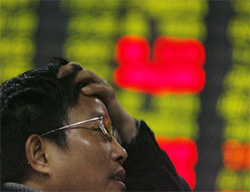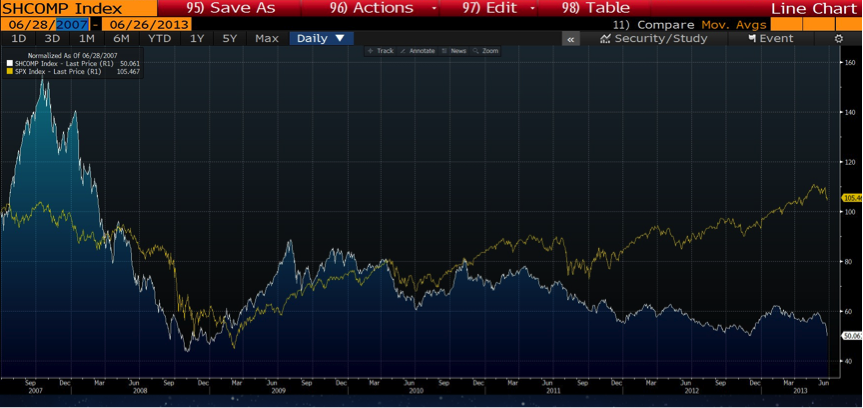
Shanghai Composite Index Continues To Disappoint
The US S&P 500 Index peaked on 22 May 2013 at 1,687 points. Despite retreating 7 per cent to 1,573 points in the past five weeks, this is 135 per cent above its GFC low.
The Shanghai Composite Index peaked in October 2007 at 6,124 points. Earlier this week it hit 1,850 points, down 70 per cent from its peak, and only 11 per cent above the GFC low of 1,665 points.
The graph below, from Bloomberg, rebases the S&P 500 and the Shanghai Composite Index to 100 and compares the Indices over the past six years (commencing 28 June 2007).
Why has the Chinese share market been such an appalling place to invest?
On the blog dated 12 April 2013, we wrote:
“It seems to us that the Chinese government’s spending, more often than not, focuses on low return investments, including fixed asset investment and infrastructure and since nine of China’s top ten companies in the Index are State owned, they will take time to remove the shackles of government policy.”
In recent events, Fitch Ratings’ Charlene Chu cut China’s long-term local currency debt rating to AA-, saying, “the credit-driven growth model is clearly falling apart.”
The Chinese banks have substantial off-balance sheet positions for which there is no asset-quality information. Some loans, often for real estate, are bundled together and sold to savers as so-called “wealth management products” – while other assets are sold to non-bank financial institutions, including trusts.
China’s shadow banking system has no transparency, is out of control, and under mounting stress as borrowers struggle to roll over short-term debts.
Chu calculated China’s total credit at 198 percent of GDP in 2012, when adding back off-balance sheet assets, up from 125 per cent in 2008. This 73 per cent increase in four years, or double the annual rate of GDP growth, “is usually one of the most reliable predictors for a financial crisis”. Chu went on to say, “There is no way they [China] can grow out of their asset problems as they did in the past. With credit at 200 per cent of GDP, the numerator is growing twice as fast as the denominator. You can’t grow out of that.”

There are a couple of reasons for the poor performance in my mind.
Firstly, the index generally reflects the historic industries of the last development stage – banks, railways, steel makers etc. As we know these are both cyclically and/or structurally challenged and wont perform. As a developing market, you get much greater rotation in indices over time than we are used to. However, the future leaders, whether they be consumption plays (like Healthcare or Technology) take time to grow and consolidate and become larger index weights. Thus, over time the index can be a poor representation of the potential returns on offer.
There is also the structural issue of the SOE’s (State Owned Enterprises) and the misallocation of resources that they utilise, through artificially low interest rates. This does not assist the economy and market as a whole.
Finally, more recently, there have been some obvious liquidity issues arising with shadow banking products. Again, as an emerging market, there are higher levels of retail investors. With any liquidity issues, retail investors will withdraw their funds from the market, for both personal liquidity and due to market concerns.
Arguably, we should look to Japan and its equity performance post its industrialisation process to determine where the best investments lie. Whilst financials, industrials, property etc performed poorly, higher tech industries, healthcare and services performed very well.
Building is good if you can flipp it, or you have positive cash flow, but if not,than you are going to have all sort of trouble.
I think it is a big mistake to try to treat government too much like business. I go to China for business and have a Chinese partner. The reality of life is that despite us investors looks for a return their is a social dividend in lifting the lives of the Chinese people. To be direct, much of China is a very unpleasant environment, I could use a more direct word but that would be nasty. Most people in China struggle in a very poor living condition and providing a better way of life for them is not going to deliver the type of ROI most investors are looking for. In reality it is not the role of government to provide a return to investors and the fact the most of China is still government controlled is a good thing for them as they do not have shareholders demanding a return. The rampant corruption puts a different spin on the reality of China, but the overwhelming poverty of the majority of people means that you could never expect for example to build a new metro system from scratch for a city and get a return on capital invested. But that does not mean that they do not need to do it. They need to do it. We need to do the same in Australia BUT the system we live under equally flawed means that the government is no capable of making the look term investment. They are also beholden to those with the short term outlook who seek to grab as much as they can for planning and engineering work, so the costs here are too high and that relegates the big projects to never even get seriously considered, such as the laughable example of the 40 year time frame and cost estimates that equates to daylight robbery for the High speed train project. It will never happen here.
But it happens in China all the time and the people of China are seeing their lives improve. I see on each successive visit to many cities in China that apart from looking like a chaotic building site, that the place is getting built into a new generation. It gets ahead of itself in some places and the market for houses is currently ahead of where many people can afford. However the people are proud of the changes and see their lives better than they were. That is the social dividend.
The other side of the ledger, the rampant corruption is being address from the top and the bottom. The nature of China means that the social unrest that is being widely reported online of fat cats with mistresses and expensive lifestyles needs to be addressed from the top and that is what happens. Imagine if the complaints we made about the fat cats who run Australia got listened to?
Really appreciate your time taken to enlighten us Scott! Thank you again or as they say here in Malaysian Borneo Tirima Casi!